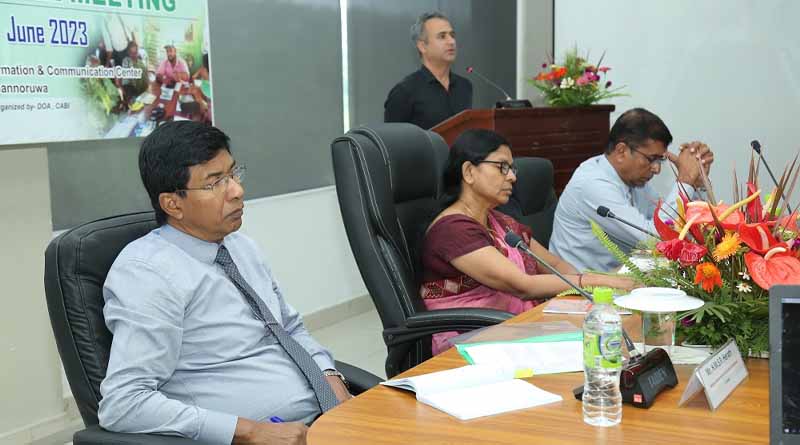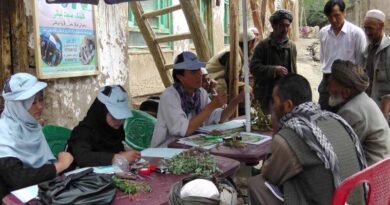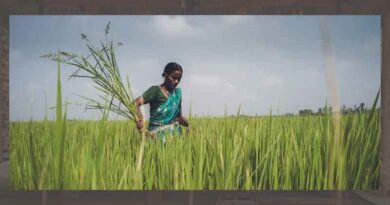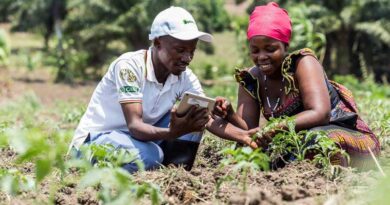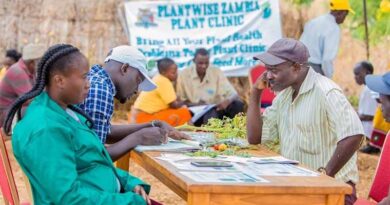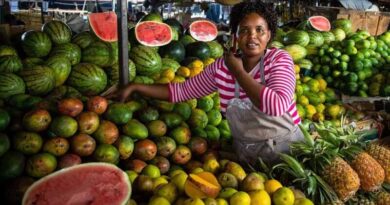Permanent Crop Clinic Programme in Sri Lanka to be strengthened following stakeholder meeting
11 July 2023, Sri Lanka: The CABI-led Permanent Crop Clinic Programme (PCCP) in Sri Lanka is to be strengthened further and provide greater help to the country’s smallholder farmers looking to sustainably protect their crops from devastating crop pests and diseases.
A meeting of stakeholders – led by CABI Liaison Officer, Ms Malathi Parasuraman, Director General of Agriculture – heard how the PCCP can be boosted by a suite of digital tools within the CABI-led PlantwisePlus programme.
The PCCP was introduced by CABI in 2009 to help smallholder farmers protect crops from pests and diseases – such as yellow stem borer on rice (Scirpophaga incertulas) – thereby minimising loses and threats to livelihoods and food security.
Promotion of biological control agents
As part of Integrated Pest Management (IPM) plans, smallholder farmers are encouraged to utilise, where possible, safer-to-use and more environmentally friendly biological control agents to protect their yields.
Since the PCCP first started, the Department of Agriculture (DOA) has carried out the programme with the help of other line agencies such as the Provincial Departments of Agriculture, the Mahaweli Authority of Sri Lanka, and the Department of Export Agriculture.
In total, 1,320 trained plant doctors operate from 910 plant clinics – supported by 40 Master Trainers – who help smallholder farmers identify their plant health problems before offering advise on how to mitigate them using sustainable IPM techniques.
Multiagency stakeholder support
Thirty stakeholders attended the meeting. These included additional Director Generals Research and Development, Directors of the DOA, Provincial Directors, Mahaweli Authority Officers, National Coordinator, Master Trainers, Coordinators for Entomology, Pathology, and Weed Science, and Private Sector Officers.
Dr Manju Thakur, CABI’s Knowledge Bank Coordinator, Dr Keith Holmes, CABI’s Integrated Crop Management Advisor, and Dr Vinod Pandit, CABI’s Programme Leader, Development Communications and Extension, also took part in the event.
Suite of digital tools
Dr Thakur presented the PlantwisePlus suite of tools that agricultural extension advisors can use. These included the PlantwisePlus Toolkit which gives advisors access to the latest information on pest distribution, diagnosis, pest management and more.
She also spoke about the PlantwisePlus Knowledge Bank. This is an open-access gateway to practical plant health information and services – from diagnostic and management advice to maps of pest locations and customised alerts on pest news. The Knowledge Bank houses over 15,000 pieces of content on crop health issues.
Also highlighted by Dr Thakur was the CABI BioProtection Portal – the largest global database of biological plant protection products where users can browse registered biological control agents relevant to pests and crops in their country.
Dr Thakur also spoke about the CABI Academy which provides a range of online training courses and certifications that develop and build plant health skills.
She also introduced the Pest Diagnostic Simulator App and the Crop Management Simulator App that are fun learning games, using real-life scenarios, to enable users to test their pest diagnosis and crop management skills.
PlantwisePlus activities
Meanwhile, Dr Holmes gave a presentation on the pesticide risk reduction pathway and Dr Pandit explained the CABI PlantwisePlus Activities.
He further mentioned that CABI would be happy to assist the Government of Sri Lanka in streamlining the current challenges in accessing and using certain digital tools relevant for the PCCP programme in the country.
Dr Pandit said, “The meeting provided the platform for the Provincial Directors of the respective nine provinces of Sri Lanka to present their crop clinic activities and also discuss their achievements and the challenges they face.
“The meeting concluded with a decision to include the PCCP as a regular extension programme to further strengthen it. It was also agreed to train new Master Trainers for each institute so that they would be readily available to train plant doctors in the relevant institute.”
Dr Pandit also said it was decided to promote the submission of prescription sheets and the use of the Plantwise Online Management System (POMS) data as a tool for pest surveillance and decision-making in the management of diseases and pests.
(For Latest Agriculture News & Updates, follow Krishak Jagat on Google News)

